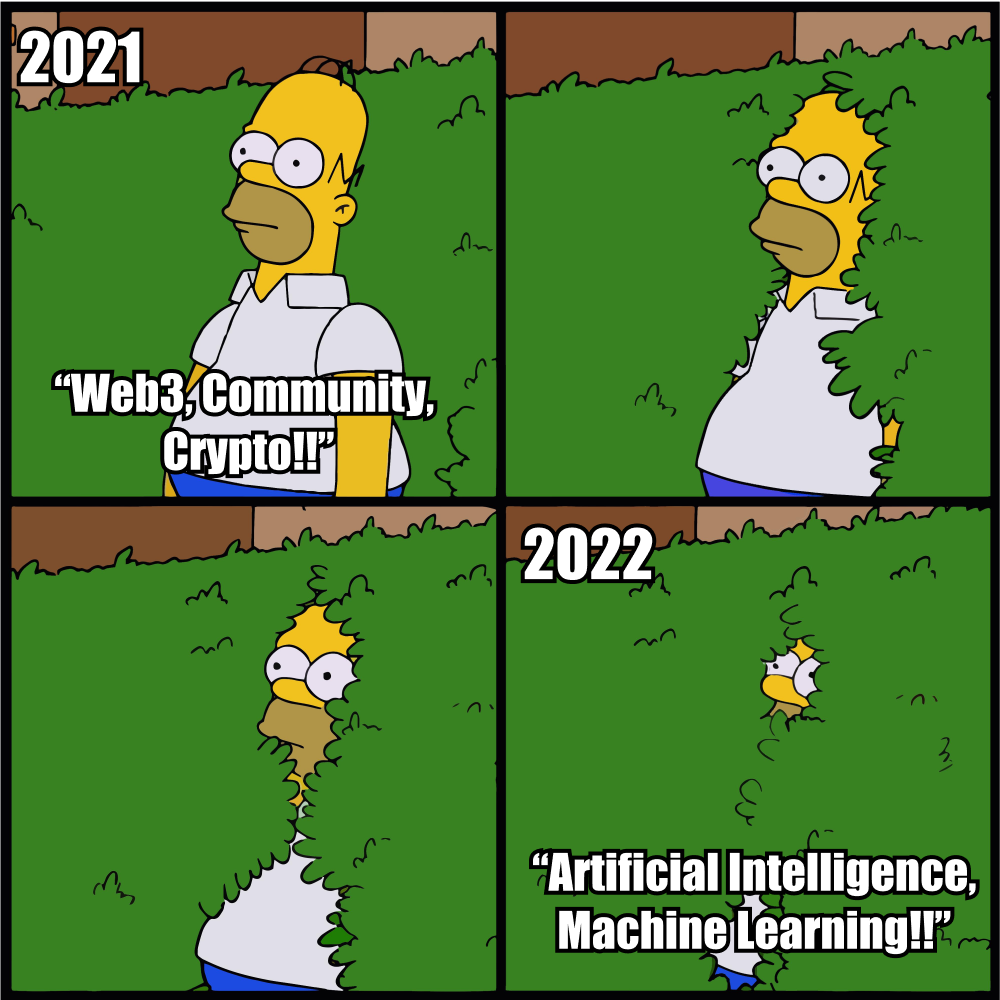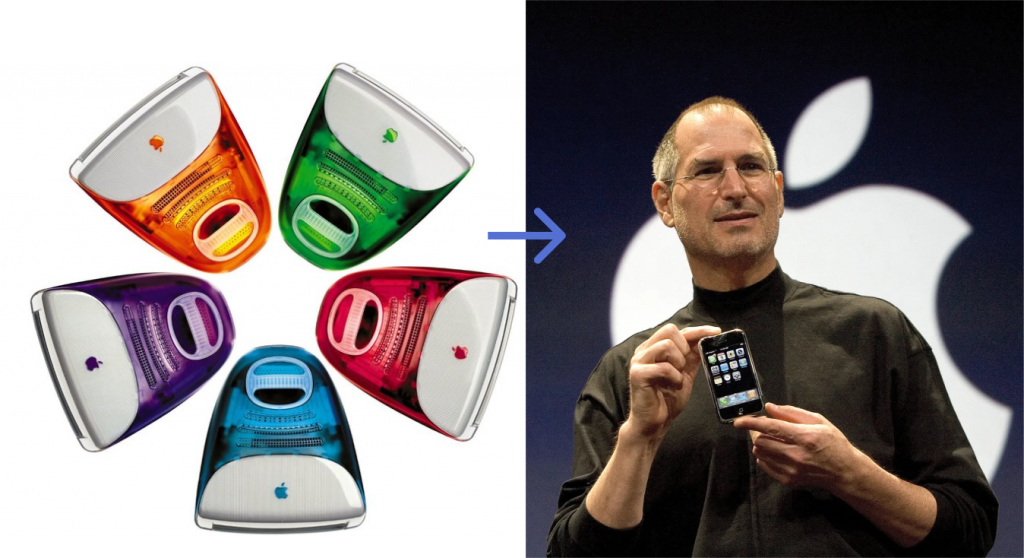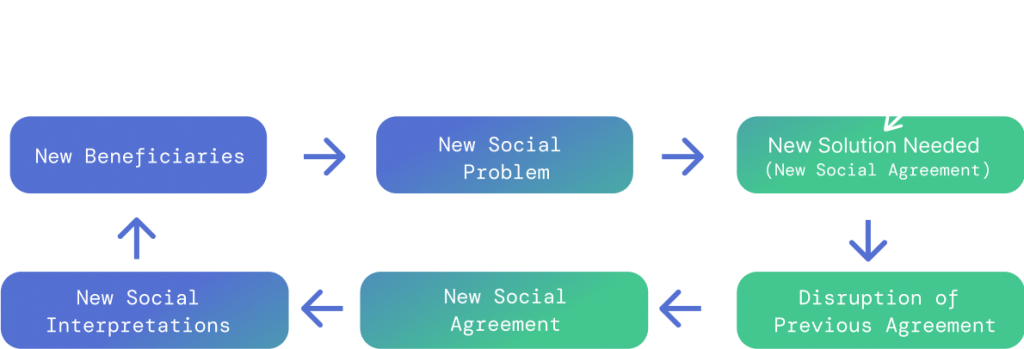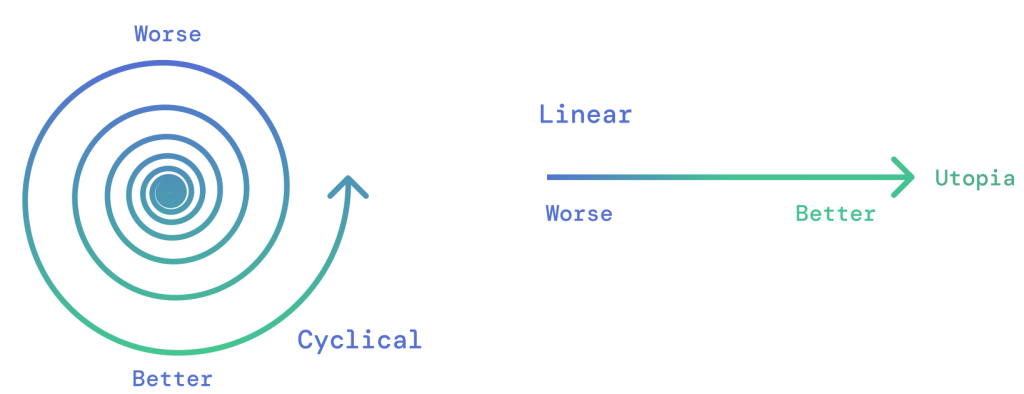Web 3, NFTs, AI, and the inability of tech to make the world a better place
Last year it was NFTs, now it's AI. New technology is always on the horizon to make the world a better place. Rejoice! This new technology will usher in utopia. Not a believer you say? No matter what, this technological revolution is inevitable.

This way of thinking is everywhere. But, as beings with agency, everything we do is always up to us. And, the introduction of something new into a system is unpredictable. Our culture perceives technological development as an inevitable process. And we believe this process is a linear trajectory to a better world. It's not.
About ten years ago, Steve Jobs presented the most beautiful smooth touchscreen device. It would change the world: the iPhone. It's easy to think of Apple as a behemoth today. Back then Apple was struggling to exist. I was in love with my colorful iMac, a much friendlier object than any PC I had ever used. Macs weren't exactly the hot sellers they are today, and most people dismissed Apple as a niche company. That all changed with the iPhone on that day. A Cambrian explosion of startups, products, and professions was born.

I was mind blown by the iPhone. Its smooth simplicity and beautiful and reactive interface delighted me. It even rotated. They designed it for someone like me. As soon as I held the iPhone in my hands I knew it was the future. My obsession to work on this device led me to become a designer. I grasped the dream of techno-utopianism: more technology, a better world.
The snowball of social media, sharing economy, and other products born then would disrupt the established order. And replace it with something better, or so we believed. Web 2.0 as we came to call it, would emancipate people. The drudgery of 9–5 jobs is a thing of the past. We would finally be our authentic selves on the web. We would find communities of like-minded people. And even freedom and democracy would propagate through the tendrils of the net.
It was easy for us to believe all this utopian thinking not only because we were naive. But, because completely unexpected occurrences reinforced these beliefs. And nothing like this had ever happened before. A young CEO wearing a hoodie was questioning old stodgy old investors. Companies were giving employees insane perks like a slide and free food. People could work any hours they wanted, drive their cars and make money doing so. All this is brought to us by the fledgling ecosystem of technologies being born. How could any of this be… bad?
The Social Construction of Technology Model defines the development of technology as a process through which innovations are adapted to social uses. These processes are not linear and impossible to predict. Technology does not determine society, but rather, society is in conversation with technology.

This means that the ways we will use technology are never pre-determined. The usage of technology is always open to constant negotiation with all actors in our society. New technologies are open to diverse interpretations, ideas, potential applications, and power structures. Any new technology has infinite unpredictable potentialities some positive some negative. "The invention of the ship is also the invention of the shipwreck" as Paul Virilio said.
Society accepted Web 2.0 as inevitable and that did lead us to a new society. The result is by no definition better (or worse, it's complicated). Conspiracy theorist uncles argue online. People stare at small screens rather than talk to each other. Anything resembling journalism has ceased to exist. The disruption of the old world and its industries didn't result in something better. But, it did result in the tearing down of some power structures to build in place different ones–new players rule the game. Think of the most powerful people and companies today–they didn't exist a few years ago.
Web 2.0 companies are now painted as the evil antagonists who own your data and control society. The savior is the decentralization brought in by Web 3.0–and there are good arguments to say this. And yet, believers who beam about Web 3.0 lost billions of dollars last year. The reality has now dawned that Web 3.0 for all its potential virtues is beholden to the interests of people–just like everything else. Now we are seeing a shift in the narrative to artificial intelligence.
Technologies are not neutral. They embody the values, preferences, and lifestyles of their creators. With Electric vehicles, we immediately confront that "better" doesn't mean the same for everyone. Rather than build the obvious solution: better public transportation. Techno-utopians hail electric autonomous vehicles as the solution to our problems. Extractive, pollutive efforts will shift from oil to rare earth minerals. In Chile, or Northern Ontario indigenous people are again exploited because they resist these activities. For them, a better future doesn't mean electric cars.
Acceptance of this fact can be difficult for us in intertwined with tech as we are. The last 50 years have transformed our planet into a plastic-filled heat dome. For (some) western people that might be a utopia, but for the native people of the Americas, this is their dystopia. As Kyle Powys White explains "settler colonial campaigns in the Great Lakes region have already depleted, degraded, or irreversibly damaged the ecosystems, plants, and animals that our ancestors had local living relationships with for hundreds of years" "The Anishinaabek already inhabit what our ancestors would have understood as a dystopian future"
Technologies can indeed sometimes transform our social and environmental relationships in insidious ways. Throughout history, human beings did not believe in this straight progression to a better world. Plato and Aristotle held a cyclical view of history, they agree that there are accidents and unpredictable moments, but they also see disaster and decline as inevitable. Hindu, Aztec and Mayan cosmology to name a few see time as a series of cycles of creation, enlightenment destruction, and decadence.
Perhaps technology shouldn't be seen as the facilitator of this linear progress but as a participant in a cyclical time. When that force clashes with our society creates a series of rippling effects that are completely unpredictable. Rather than assume more is always we better realize that unpredictable and possible very negative outcomes are not only possible but probable.
We have to acknowledge the failure of technological solutions to make the world better and change our relationship with technology and the rest of the Earth. Designers are not the stewards of technological development, we are here to solve human problems. So what do we do?

Civilization is a 20,000-year-old process of humanity becoming wiser and learning to live on our planet. Some want to believe that our goal is to bring about a technological rapture, no matter the cost. It's difficult as an individual to pretend as if we can do much. But rather than this being a negative outlook we should accept it as our condition, and begin from there. The stories we tell ourselves drive our behavior. If we measure and believe more tech equals a better world that's what we will direct ourselves towards.
Even if it seems there's little we can do, the work starts small and at the personal level for now. Challenge your beliefs and those of others.
Ask yourself:
1) What negative impacts will the rise of this technology have?
2) Who controls this technology, who gains power or has vested interests in its propagation?
3) Which social groups are impacted by this technology?
4) Which non-human entities are impacted by this technology?
5) How is the environment impacted by this technology?
5) Which values, interests, and politics are embedded in this technology?